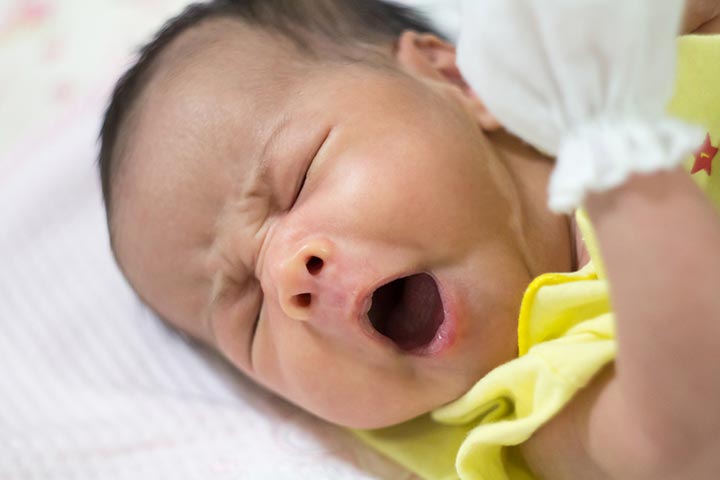New parents may get anxious when they notice their babies gasping for air. Babies gasping for air may not always be a cause for concern. Nevertheless, it helps to know the normal and the abnormal causes that may lead to gasping.
Babies usually gasp when something is stuck in their throat, such as extra mucus due to a cold. They usually grow out of gasping as their respiratory systems mature. Read about the different reasons that may cause gasping in babies and when to be concerned.
Possible Causes Of Baby Gasping For Air
A newborn baby is born with non-inflated lungs that are filled with fluid. The baby takes their first breath in about ten seconds after birth, and this breath may sound like they are gasping for air(1). Beyond their first breath, the following conditions may cause a baby to gasp for air while breathing.
1. Respiratory infections
Infections of the nose, sinuses, throat, airway, or lungs are known as respiratory tract infections. Viruses such as rhinoviruses, influenza, parainfluenza, respiratory syncytial virus, enterovirus, coronaviruses, and some strains of adenoviruses are the leading causes of respiratory infections in infants(2).
Respiratory infections cause excess mucus secretion and inflammation of the respiratory tissues, causing gasping due to difficulty breathing. Other signs and symptoms include fever, cold, cough, sore throat, and pain in the ear(3).
2. Asthma
Asthma is a disease characterized by chronic inflammation of the airways. The root cause of asthma is unknown (4). According to the Asthma and Allergy Foundation of America, asthma can cause labored breathing, panting, wheezing, persistent coughing, difficulty sucking, and fatigue(5).
3. Exposure to second-hand cigarette smoke
Smoking in the same room as the baby may irritate their respiratory tracts. It may also lead to asthma. Therefore, smokers should be discouraged from smoking in the house where the baby lives (4).
4. Laryngomalacia
Laryngomalacia is the leading cause of noisy breathing in infants. It happens due to floppy tissues above the vocal cords. It gets corrected in 70% of infants by the time they are one year old and in 90% of the infants by the time they are two years old(6).
5. Sleep apnea
Sleep apnea is a sleep-related breathing disorder. Obstructive sleep apnea occurs due to the narrowing of passages between the nose and the lungs. Babies with sleep apnea may pause for breaths, gasp for air, and have noisy breathing(7).
6. Pertussis (Whooping cough)
Whooping cough is a contagious bacterial infection. Babies with pertussis infection make a whooping sound when they breathe in after coughing(8). The infection may also cause a baby to gasp for air. The vaccine for whooping cough could significantly prevent the risk of developing the infection.
7. Premature babies
Respiratory distress is a common problem in premature babies. Babies born before 37 weeks are at a higher risk of developing respiratory distress syndrome. Babies with respiratory distress syndrome have to work very hard to regulate their breathing and might gasp for air (9).
8. Meconium aspiration syndrome
Meconium aspiration syndrome occurs when the newborn inhales amniotic fluid along with the meconium while still in the mother’s womb. The meconium (baby’s first poop)may clog or irritate the airways, injuring the lungs and making it difficult to breathe. Babies with this condition may need to be admitted to the neonatal intensive care unit (NICU)(10).
9. Reflux
Reflux happens when the muscle at the end of the esophagus is loose or opens up when not needed. It may cause food and stomach acids to flow upward to the throat, irritating the airways along the way. Severe or persistent reflux may lead to breathing problems in babies, causing signs such as gasping (11).
10. Dry air
Some babies may gasp when the ambient air is dry. In such cases, the baby will be healthy and will not show any sign of disease or distress. Gasping due to dry air can be easily avoided by installing a cold-mist humidifier in a baby’s room.
When To See A Doctor?
You must consult a doctor soon if your baby displays the following signs.
- Notable signs of infection, such as fever, poor appetite, lethargy, or crankiness
- Baby’s skin, especially that of the face, appears blue, indicating poor oxygen levels in the body
- You suspect the baby is gasping due to a foreign body stuck in the airways
- Gasping is accompanied by wheezing or whistling sounds
- Baby has chest contractions suggesting severe difficulty in breathing
- Baby began gasping after coming from outdoors or due to exposure to a substance, such as aerosol spray
- Baby started gasping after eating a food item
Ways To Reduce Gasping In Babies
Knowing the cause may help reduce gasping in babies, especially in cases of infections. The following interventions could reduce and prevent gasping in babies.
- Feed the baby in the right position to prevent reflux. You may hold the baby in your arms for some time after feeding them. For bottle-fed babies, you may hold the bottle in a horizontal position. It mimics breastfeeding as the milk drips down slowly from the bottle. This is known as paced bottle feeding. Speak to the pediatrician and change the formula milk to check if it helps relieve reflux.
- Always put the babies to sleep on their back. It reduces the risk of choking on any regurgitated milk. It also reduces the risk of sudden infant death syndrome (SIDS).
- Vaccinate your baby as per the pediatrician’s recommendations. Vaccines may help prevent several respiratory tract infections that often cause gasping.
- Use saline drops to clear their noses and keep their airways open. Speak to a pediatrician who may show you the right way to clear the baby’s nose.
- Avoid exposure to any second-hand cigarette smoke and vehicular smoke. If your baby has allergies or asthma, keep them away from potential allergens.
- Use a cool-mist humidifier if the air is dry, such as during winters. Moist air could make breathing easier for a baby.
It is best to consult a pediatrician if you notice your baby gasping for air since it could occur due to serious conditions as well. General steps of care at home, such as avoiding allergy triggers, often help avoid the condition. You may check with the doctor if they suggest using humidifiers or vaporizers in the baby’s room to keep the airways moist and open.

